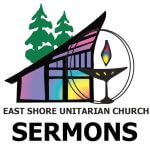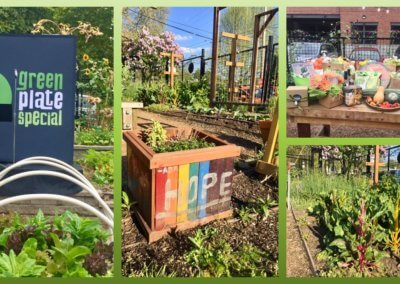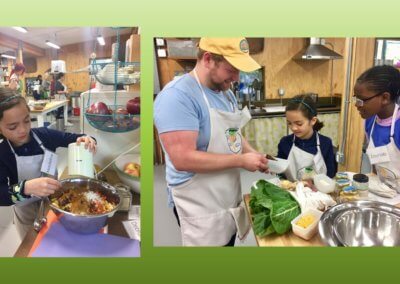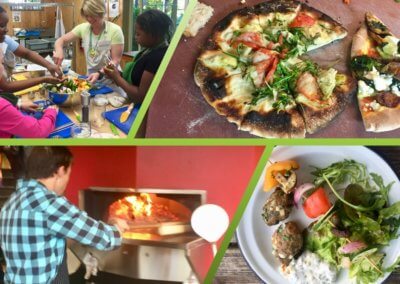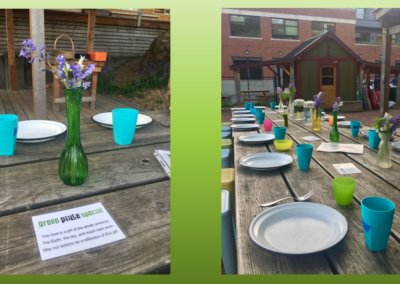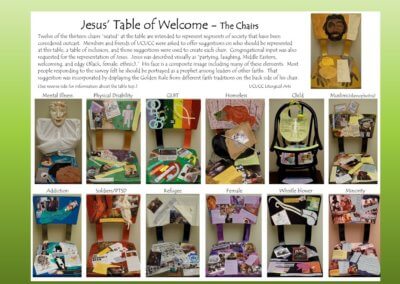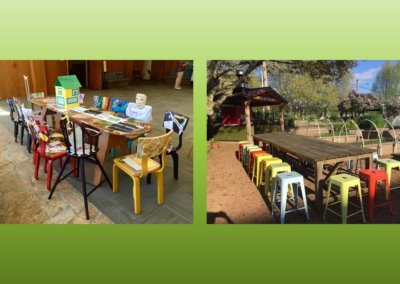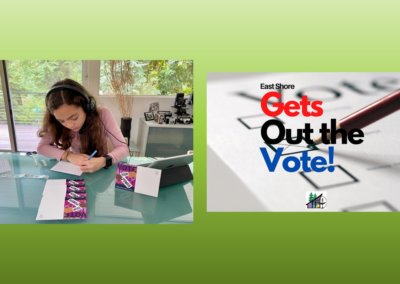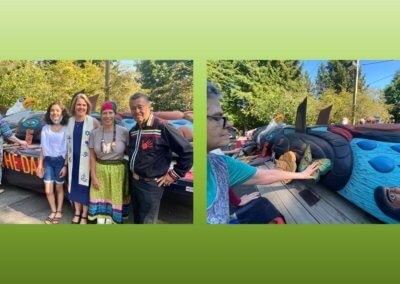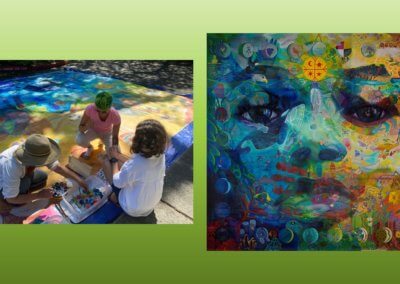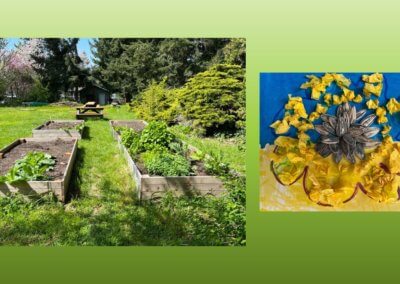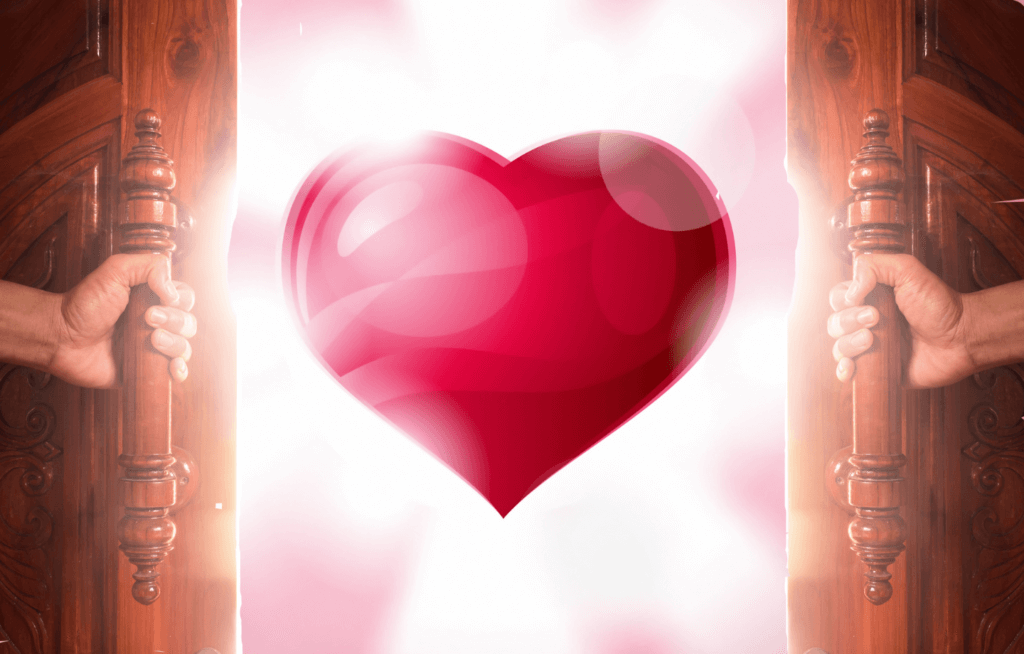
- This event has passed.
Bridging the Divide through Food & Fellowship
Sunday, July 10 @ 10:30 am - 11:30 am
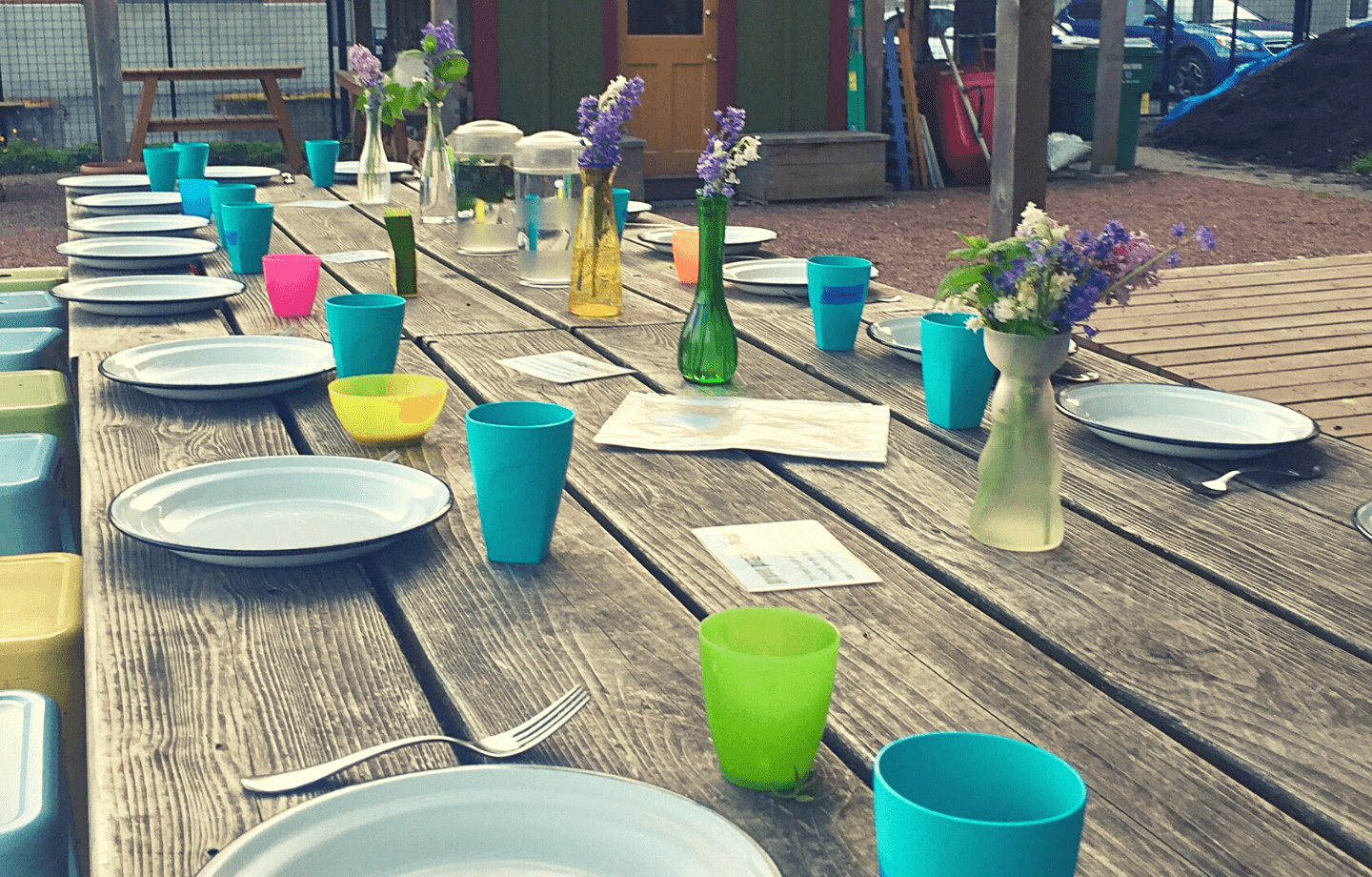

In the midst of our divided nation, how do we move from the paralysis of fear toward a greater sense of freedom, hope and healing? Please join us as we explore this question within the theological context of a welcome table of hospitality, bridge-building and social justice.
Rev. Jennifer DeBusk Alviar is an ordained Unitarian Universalist minister. Her unique call is to expand the welcome table of hospitality, inclusion and liberation. To this end, she cultivates positive relationships with community organizations and diverse faith traditions actively engaged in the healing work of bridge-building and social change. Rev. Jennifer received her Master of Divinity degree at Starr King School for Ministry in Berkeley, California. She currently lives with her family on the traditional land of the Duwamish people known as Seattle, Washington.
How to Attend
In person participants MUST BE VACCINATED! Read more about the process here.
• To virtually attend, please Zoom in using room number 989 3107 9078, passcode: chalice.
• To phone into the service, call 669-900-6833, Meeting ID: 989 3107 9078.
For those joining virtually, please mute as soon as you enter the room, so everyone can hear. Please note, the services will be recorded, but at this time, there are no plans to share the recording.
More Information
Both virtual and in person services are followed by coffee hour.
Story for All Ages
Sermon Audio
Bridging the Divide through Food & Fellowship
Sermon Text
INVOCATION
It is early November 2020. I receive a call from a Unitarian Universalist church in Florida. The congregation invites me to deliver a virtual worship service as a guest preacher on November 15th. This particular date marks less than two weeks after the contested Presidential election between Trump and Biden. The worship team makes this request: “Would you please preach on the state of our nation and the state of our souls given our divided country?”
I contemplate this moment. I am a UU minister from a northern blue state being invited to preach to a southern red state. What might I say to help bridge this divide at such a polarizing time? I thank them for this kind offer and tell them that I need some time to think about it. I will get back to them shortly. They agree.
During this discernment process, it occurs to me that the November election overlaps with a season of food and fellowship. Perhaps if I frame this sermon within the theological context of a welcome table, then maybe I can navigate these delicate boundaries in a spirit of grace, hospitality and inclusion.
So, I agree to this guest preaching opportunity. I begin collecting stories, hymns, readings and prayers that embrace a unifying message about healing our nation through this bridge-building effort. I do my best with this sermon considering the timing and topic. The UU congregation in Florida graciously receives my message. Yet I can’t help feeling that I somehow missed the mark.
I wasn’t able to pinpoint exactly why at that time. But if this global health pandemic has taught me anything over these past 2+ years, it is this: we can’t heal our nation collectively. Bridging the divide can only be done relationship by relationship within our own specific communities. In other words, we build trust – politically and religiously – through the distinct character of a place and the unique people in it. A diplomatic message of unity offered in the abstract just doesn’t cut it.
URBAN FARM: GREEN PLATE SPECIAL
To further illustrate my point, I would like to share with you a story. I recently participated in a storytelling workshop with a nonprofit called Rite of Passage Journeys. The facilitator, Ben Dennis, invited us to tell, what he called, a generative story. Storytelling as an agent of social awareness and transformation. Here were some of his guidelines:
- Choose a story that speaks to your place in the world. Draw from experience that is personal, has meaning within your community, and where you have skin in the game. Please, let’s do our best to avoid rants and grand political issues—again, be personal.
- Focus on a trajectory; the journey of revelation, lessons learned, resolve, etc.
- If possible, let your journey be a Gift that you share. All of us have stories that are wonderful—even the tragic ones are gifts. Be poetic, creative, and loving!
I thought about many stories I might tell. But there was one in particular that kept coming back to me. I kept pushing it away. “No, not that one!” But it was one of those stories that insisted on being told. I became curious about its urgings. Why this story? Why now? I realized that it was a story about food, fellowship and forgiveness. A timely message for all seasons.
So, here is my story.
It is dinner time. I am in the kitchen with my daughter, Madeline, who at that time was nine years old. The sights and smells of the kitchen create a warm, cozy feeling between us. I am browning some meat on the skillet as we chat happily together. Suddenly, I hear a pop. Then a scream. The hot oil from the skillet accidentally spills onto my daughter’s body causing a burn on her belly.
I know we all make mistakes. Accidents happen. But self-forgiveness is hard to come by. In time, the physical wound heals. But the emotional scars remain. My daughter’s natural spirit of joy is replaced by fear and anxiety. This breaks my heart. I reach out to Madeline’s pediatrician, Dr. Lenna Liu. “Please help me!” I plead. “This cooking accident seems to have paralyzed Madeline with fear. I need some way to free her from this anxiety. How can we move from the paralysis of fear toward a greater sense of freedom, hope and healing?”
Dr. Liu is compassionate and resourceful. She introduces me to the nutritionist, Rebecca Finkel. This one pivotal introduction forever changes our lives. Rebecca looks into my anguished face and says, “Your timing is perfect. Seattle Children’s Clinic at Odessa Brown has just developed a brand new partnership with a nonprofit called Green Plate Special. You are welcome to join a 6-week parent/child cooking class. This class takes place in a wonderful, organic garden on an urban farm. Kids gain a holistic approach to cooking, nutrition, gardening and meal sharing catered to a diverse community. I think you’ll really enjoy this innovative seed-to-table learning environment. Best of all, it starts next week!” I am filled with immense gratitude.
On the first day of class, Madeline and I open the garden gate and walk in. This garden bursts with joy, overflowing with brightly colored flowers and fresh fruits and vegetables. I take in a deep, hopeful breath. My body relaxes.
Then Madeline runs over to the chicken coop. I don’t know what it is about chickens, but they seem to put everyone at ease. As Madeline feeds the chickens, other kids join her creating a lively spirit of playfulness, curiosity and friendship.
In the kitchen, spices and fresh herbs tantalize our senses. We learn about culturally relevant foods from around the world. First, we cook a South Indian vegetable stew called sambar. Next, we prepare and savor an East African vegetable curry dish.
Then, we use our hands to shape Middle Eastern kofta meatballs grilled on skewers accompanied by fresh garden vegetables and delicious tzatziki sauce.
And finally, a crowd pleasing favorite — homemade pizza with Italian tomato sauce, herbs and mozzarella cheese baked in a wood burning oven.
Are you hungry yet? At the end of Madeline’s 6 weeks with Green Plate Special, she has indeed regained her joyful spirit, along with valuable cooking skills and a deep appreciation for food and fellowship.
This alchemy between food and fellowship leads me to reflect on a larger question. Each of us, at one point or another, is wounded by life. Some of our wounds are physical. Other wounds are emotional. Oftentimes, our pain is a mix of both. How can we move from the paralysis of fear toward a greater sense of freedom, hope and healing?
In my experience, the most profound truth lies in this humble prayer recited before each meal at Green Plate Special:
This food is a gift of the whole universe.
The Earth, the sky, and much hard work.
May our actions be a reflection of this gift.
In the most tender moments of life — vulnerable, raw and in pain — the earth gives herself to us. A seed was planted on fertile soil the day that I reached out for help and was graciously cared for. Madeline’s healing — and mine as well — began with four simple ingredients: a clinic, a nonprofit, a garden and some chickens.
For me, it all comes down to this. On days when life feels scarce and I am short on hope, I shut my eyes and breathe. I imagine myself back in that beautiful, soulful garden. Then I pray. I pray that my actions may indeed be a reflection of this gift richly given and humbly received. Here, in this garden, I find freedom, hope and healing.
This storytelling experience offered me a priceless gift. I discovered that what we are really practicing is not a polished version of our spoken words, but rather practicing our humanity in community with others. I invite you to name or feel your way into your own lived experiences where your humanity has been expanded through community connections, your soul forgiven for mistakes made, and your spirit uplifted, renewed and restored. Reflect on a moment where you have encountered a greater sense of healing and wholeness in a fragmented world. Breathe deeply into that moment. And may you be blessed.
May you also know this. The way that we move from the paralysis of fear toward a greater sense of freedom, hope and healing is not just through food. It also requires chairs of representation for the creation of a true, inclusive, embodied fellowship. In the midst of fear, our natural human impulse is to move out of our bodies and into our heads only fueling greater anxiety. Yet the artists, poets and mystics know better. They act like wise fools and sacred tricksters. They find creative, subversive ways to guide us back to ourselves and give us the strength to explore the world’s injustices through a lens of liberation.
CHAIRS OF REPRESENTATION
At least, this is how I experienced it when I first met liturgical artist, Kris Garratt, at University Congregational United Church of Christ in Seattle. https://garrattarts.org She designed a most thought-provoking set of chairs depicting Jesus’ ministry of inclusive table fellowship.
As Kris explained, “Twelve of the thirteen chairs ‘seated’ at the table are intended to represent segments of society that have been considered outcast.” Imagine engaging in a meditative practice of sitting in a chair that represents, for example, Addiction. What might that embodied sensation feel like for you? Hold this question in your heart and mind as you move to another chair. Take a seat. Experience, on a deeply sensory level, what it feels like to inhabit the chair of an LGBTQIA+ person. Or someone who is Unhoused. A BIPOC person. A Refugee. What does this sensory meditation bring up for you on a body level?
These chairs were designed many years ago and some of the societal language has since changed. Perhaps there are other chairs you might add and other names you might offer if you don’t feel that your own lived experience is represented here. Yet the singular wound of being excluded from the welcome table of hospitality and inclusion remains painfully vivid and alive for many people today in our unjust society.
Notice how the vibrant colors and the particular arrangement of chairs displayed within the UCUCC church are strikingly similar to Green Plate Special’s urban garden. As a people of faith and service, we are called to connect our church values of love and justice through relationship-building within our larger community.
This is why I feel called toward a community ministry of bridge-building and liberation. As someone who is neurodivergent with a hidden disability due to a childhood brain injury, I have learned to navigate my way between the seen and unseen realities of life that move me toward justice. It is often our wounds that reveal an intimate understanding around the value of allies vs. the individualism of self-sufficiency.
Take Moses, for example. He did not liberate the Israelites from Egypt single handedly in all his power, strength and glory. No. Moses had a speech impediment. He felt unqualified to speak directly to the Egyptian high priest imploring Pharoah to let his people go. To accompany Moses on his journey, God offered him allies. Moses’s brother, Aaron, served as his spokesperson in communicating to Pharaoh. Moses’ sister, Miriam, served as a prophetess who raised her timbrel and led the Hebrew women in song and dance celebrating their escape from slavery in Egypt after the parting of the Sea of Reeds. Ultimately, liberation happened through a strong network of trust and collaboration among allies and partners.
We can’t heal our divided nation collectively in the abstract. But we can help to liberate and heal some of our social injustices through our own particular connections and unique relationships. When we act for justice in partnership with others, we put a human face on social issues. We break down barriers. Our actions keep us from becoming invisible, dehumanized, alienated and anonymous.
To this end, I would like to share with you some examples of community partnerships that we have cultivated here at East Shore Unitarian Church. My hope is that these examples might spark ideas for further social justice projects across diverse faith traditions and other community organizations. In doing so, we help to model a welcome table of hospitality, inclusion and liberation.
2020: UU THE VOTE
In the months leading up to November 2020, East Shore partnered with our social justice organization called UU the Vote. We planted seeds of hope and nurtured life-giving soil for political social change through the democratic process. Our church joined a nation-wide movement with other UU congregations and the broader community. We helped get out the vote through postcard and letter writing, along with phone and text banking.
2021: RED ROAD TO DC TOTEM POLE JOURNEY
In July 2021, East Shore engaged in honoring indigenous rights through a ceremony called The Red Road to DC Totem Pole Journey. The Lummi House of Tears Carvers blessed us by visiting our church bringing their stories to share, along with their 24-foot totem pole designed by Master Carver Jewell James. The Red Road to DC Totem Pole Journey brought public attention to the need to protect Native American sacred sites, lands, and waters across the country. Washington DC’s Secretary of the Interior, Deb Haaland, the first Native American to hold this position, received the pole, its vision and welcomed the message.
2021: E ALA E! COMMEMORATIVE MURAL
As part of this same idigenous ceremony, Guatemalan social artist, Melanie Schambach, brought her 18 x 18 foot commemorative canvas mural to share with the East Shore congregants. She invited everyone to paint images, visions and symbols of what is spiritually central to our lives and how we connect to Mother Earth. Its mural title, “E Ala E!”, is a Hawaiian expression that refers to the morning sun which awakens us to each new day. Each of us can decide how we will live that day and do right by all — the people in our lives, the sacred earth, land, waters and all living beings.
2022: SUNFLOWER PEACE ART FUNDRAISER FOR UKRAINE & ESUC P-PATCH
Most recently in April 2022, East Shore’s Children and Youth ministries engaged in a Sunflower Peace Art fundraiser to support Ukraine. All proceeds benefit the Emergency Relief Fund Ukraine Response through our partnership with the Unitarian Universalist Service Committee (UUSC). Sunflowers represent Ukraine’s national flower, as well as a symbol for peace. Currently, these sunflowers are serving as a symbol of resistance against the country’s invasion by Russian forces. Our youth will be planting sunflower seeds in our thriving East Shore P-Patch to further symbolize solidarity with Ukraine.
BENEDICTION
In partnership with others, we move from the paralysis of fear toward a greater sense of freedom, hope and healing. This is how we bridge the divide through food and fellowship, in addition to faith and service. And this is how we work to assemble the chairs of representation and power to create a truly inclusive, embodied welcome table. In doing so, we create space for the possibility of grace, healing and liberation. May it be so! Amen, Shalom, Salaam, Namaste and Ashe.
More Music
Event Details
Transportation & Parking
Google Maps offers you door-to-door directions for driving, walking, biking, or public transit.
We have several parking lots. Our upper lot, off SE 32nd Street, is closest to our Sanctuary, it has handicap and stroller parking. There is a roundabout for drop-offs. Our lower, main parking lot is also off SE 32nd Street. There are stairs that will lead you up to the Sanctuary. If that lot is full, there is also street parking on 32nd Street.
Accessibility
Learn more about accessibility at East Shore here.
